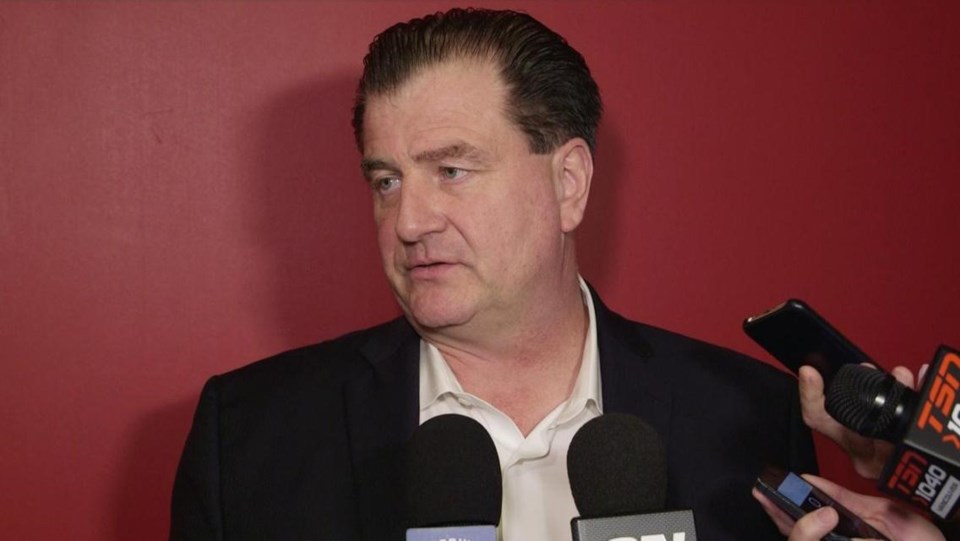The Canucks caused a stir on Wednesday morning when the media walked into the Norm Jewison Media Room to discover a table set up with two microphones. This kicked off endless speculation on Twitter, with several entertaining theories floated by Canucks fans.
Were Trevor Linden and Jim Benning launching a podcast? Joining The Athletic? Is Nikita Tryamkin back after he was left off the active roster for the Olympics? Or was the press conference to announce the acquisition of a new microphone?
Instead, the most likely reason for a two-microphone press conference turned out to be the right one: the Canucks are announcing a multi-year extension for Jim Benning.
I say “multi-year” because the Canucks have been no more specific than that in their press release. Elliotte Friedman suggested that three years was the rumoured length of the contract, but that is not yet confirmed.
This contract extension is likely to be a divisive one among Canucks fans, who can’t seem to agree on how well Benning has done in his time as general manager. There seems to be very little middleground: fans either think he has done a fantastic job building for the future or that he has been a disaster.
Benning received mostly positive reviews in the summer. He came through at the 2018 trade deadline, moving Alex Burrows and Jannik Hansen for two good prospects. The draft went well, adding a potential franchise centre in Elias Pettersson, along with several other promising prospects. And he avoided long-term contracts in free agency, even if it seemed like he signed a few too many free agents.
Those reviews have turned a little less positive as the season has progressed and the free agent signings have, aside from Thomas Vanek, failed to pan out.
Sam Gagner has struggled to match his point production from last season and his defensive flaws have been as advertised. Michael Del Zotto has been a reliable presence in the lineup, but not in the defensive zone. Anders Nilsson has one of the lowest save percentages in the league and seems to have completely lost the trust of the coaching staff.
Meanwhile, Patrick Wiercioch hasn’t left the AHL all season and Alexander Burmistrov bolted back to the KHL.
Perhaps Benning’s performance in free agency this past year looked good more in comparison with the previous year, when he signed Loui Eriksson to what is shaping up to be one of the worst contracts in the NHL. It just gets worse the longer you look at it and the longer Loui Eriksson struggled to be anything more than a solid, two-way winger. It’s a buyout-proof, trade-proof anchor of a contract.
It hasn’t been all bad for Benning, by any means. The Canucks do have a strong prospect pool, even if its strength has been somewhat exaggerated. Elias Pettersson, Adam Gaudette, Olli Juolevi, and Thatcher Demko all have fairly certain NHL futures, while Jonathan Dahlen, Nikolay Goldobin, Kole Lind, and Jonah Gadjovich all have potential.
There are three issues here, however. One is that drafting is a team effort. There’s a tendency to give the GM all the credit for good drafting (and all the blame for the bad), but drafting, more than any other part of management, is performed by a team. The GM provides direction, vision, and the final say, but so much of the nitty-gritty of it is out of his hands.
The second issue is that the Canucks still have large holes in their prospect pool that prevent it from truly being considered elite. Aside from Olli Juolevi, the Canucks have massive question marks when it comes to defence, but there’s a drastic drop-off at every position after the top tier of prospects. As much as the Canucks have added some excellent prospects through trades and the draft, there’s still a lot of work to be done.
And the third issue is that the Canucks have badly missed on some of their most important picks. This is re-hashing old arguments, but the Jake Virtanen pick was a clear miss. There’s a strong possibility that the Olli Juolevi pick was also a miss, though there’s room for optimism there.
The other two components of management, contract negotiations and trades, have been hit or miss. Benning re-signed Chris Tanev to a very team-friendly deal, but has overpaid others, like Brandon Sutter and Luca Sbisa. There’s also the Eriksson contract, as mentioned above.
There are some clear hits in Benning’s trade history — moving Eddie Lack and Kevin Bieksa for picks, as well as the acquisition of Sven Baertschi and Markus Granlund — but there have been some high-profile misses as well, such as the Sutter and Erik Gudbranson trades. Both sacrificed future assets for current competitiveness, and that competitiveness has not surfaced.
Therein lies the real problem: the Canucks have missed the playoffs in three of the four seasons of Benning’s tenure, all while the stated goal from management has been to make the playoffs. If the intention was to remain competitive while building for the future, he has failed at half of that goal and it remains to be seen how well he has done with the other half.
If the intention has not been to remain competitive, but to stealthily tank for the last three seasons, then Benning has been lying to the fanbase throughout his tenure and is a significantly better liar than anyone thought.
There are positive signs, of course. Brock Boeser has been legitimately outstanding, the kind of reputation-building pick you want to see in the back half of the first round. And Benning could go a long way towards addressing the Canucks’ needs with a bold trade deadline and another strong draft.
The question is whether Benning has learned from the false start at the beginning of his tenure as Canucks GM or if he will continue to play the drum of remaining competitive while building for the future, all while failing to actually remain competitive.



